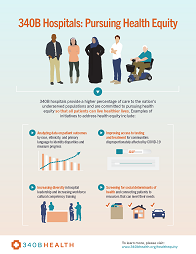340B Hospitals Are Key to the Pursuit of Health Equity
by Admin | February 8, 2021 5:06 pm

February 8, 2021– A global pandemic, an economic recession, and social strife in communities across the nation have cast a bright light on the deep racial and ethnic inequities in the U.S., starting a national dialogue that aspires to put us on a path toward real change. President Biden and his administration have made pursuing equity in health care and many other areas of our society a priority for the government and the people it serves.
Hospitals participating in the 340B drug pricing program are a key element of the nation’s response to this pressing issue. As safety-net providers, these hospitals serve a significant percentage of people who historically have been underserved. These include people who are living with low incomes, are in rural communities, are Black or African American, are living with disabilities, and are either uninsured or reliant on Medicaid for their care. The work of these hospitals on pursuing equity thus can have a real impact.
The communities that 340B hospitals typically serve also confront numerous barriers to care, including lack of access to food, poor housing, limited transportation, and lack of insurance. These social determinants of health (SDoH) are an integral element of the response to inequity in health care and health outcomes.
340B Health’s new report, 340B Hospitals in Pursuit of Health Equity: Best Practices from the Field[1], documents these efforts for nine 340B hospitals and health systems.
Common Themes
Many of the 340B hospitals started their comprehensive health equity work with an inward focus on building cultural competency and reducing implicit bias among their workforces; diversifying staff, leadership, and board composition; and examining hiring, purchasing, and investment practices.
Data also are central to identifying disparities and measuring progress toward eliminating them. 340B hospitals’ collection and use of data on race, ethnicity, and primary language often uncovered previously hidden disparities in care such as racial and ethnic differences in screening rates for cancer, the prescription of pain medication, birth outcomes, and other care quality measures. These findings led to targeted interventions and marked improvements.
By screening for social determinants of health and partnering with community organizations to address them, 340B hospitals have worked to help people meet needs for food, transportation, employment, and housing that will translate into better health. One hospital profiled in our report created a mobile health unit to ensure that children would receive the medical screenings required for enrollment in the Head Start program.
COVID-19 spurred equity-focused action on multiple fronts. Health providers at 340B hospitals went outside their facilities to provide education, masks, tests, and other supplies directly to underserved communities. They now are gearing up similar efforts to administer the vaccine to all those who are at greatest risk. They also have partnered with community organizations to provide safe access to food for the growing number of people economically harmed by the pandemic.
Within the four walls, hospitals have worked to ensure translation services are meeting the needs of diverse patient populations, clinical trials are more representative of different populations, and hospital employees have access to childcare, among other efforts.
340B Savings Are Invaluable
The 340B program is central to achieving health equity. 340B savings enable hospitals to support services not paid for by most insurers, such as translation services, or under-reimbursed, such as mental health care.
340B provides invaluable resources and access to care to help hospitals strike at the very heart of health inequity. If 340B hospitals address disparities in cancer screening, but diagnosed patients have no access to affordable cancer drugs, the hospitals’ efforts will be unsuccessful.
340B resources enable hospitals to provide the care and support beyond the four walls that are vital to meeting diverse patient needs. 340B-sponsored mobile clinics bring care directly to underserved communities. Case management initiatives help patients navigate the complex web of community services that are available to them.
And 340B serves a broader, more existential purpose for systematic efforts to pursue health equity. In many cases, 340B savings are what enable the hospital to remain open and ready to fulfill their patient missions to all those in need.
Read our full health equity report[2] and see our infographic[3] summarizing the key findings.
- 340B Hospitals in Pursuit of Health Equity: Best Practices from the Field: https://www.340bhealth.org/files/Health_Equity_Report_2021_FINAL.pdf
- report: https://www.340bhealth.org/files/Health_Equity_Report_2021_FINAL.pdf
- infographic: https://www.340bhealth.org/files/Health_Equity_Infographic_2021_FINAL.pdf
Source URL: https://340binformed.org/2021/02/340b-hospitals-are-key-to-the-pursuit-of-health-equity/